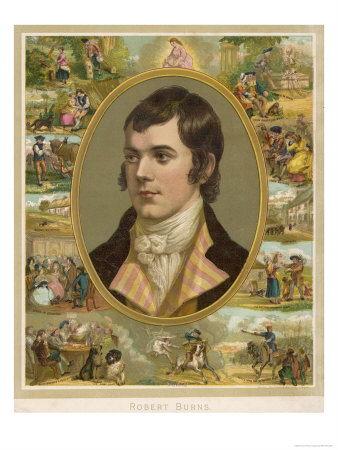January 25
|
Lang syne, in Eden’s happy scene When strappin Adam’s days were green, And Eve was like my bonie Jean My dearest part, A dancin’ sweet, young handsome quean, O’ guileless heart –from Address to the Devil (unpublished version) |
|
Without ever picking up a sword or musket, Burns became a national hero of the Scots. His weapon was the pen. His ammunition the Scottish language. (Yes, they have their own language).
Even in Burns’ day the Scots language (a collection of dialects such as Doric, Buchan Claik, and Lallands) had lost favor with the upper crust. The 1707 Treaty of Union had united Scotland with England to form the Kingdom of Great Britain, and the new establishment, for fear of sounding provincial, distanced themselves from the ‘auld’ dialects. English became the de facto language in education, and the language itself was blending with that of their neighbors to the south.
Robert (Rabbie) Burns entered the world on this day, 1759. His father was a gardener and an unsuccessful farmer, but he managed to secure an education for Robert, the first of his seven children at the village school.
“Forming a bachelors’ club and debating society at Tarbolton, young Robert became a Freemason, worked as a flax dresser in Irvine and enjoyed an active social and sexual life.”
The Canongate Burns By Andrew Noble
After his father’s death, Rabbie was forced to return to farming to support the family. It was during these years that he wrote some of his most famous poetry. (And conducted some of his more fruitful love affairs.) He also scoured the countryside collecting the traditional folk songs of his people, which would have otherwise been lost to history. His collection, Poems, Chiefly in the Scottish Dialect earned him rapid fame, but not fortune.
Unlike the born-wealthy poets of his day, Burns earned very little from his writing. He continued to farm, and when the farm failed, he became an excise officer in Dumfries. His romantic, radical, idealist persona fostered by his works did not always match his life. Burns is often described as having a “weak heart,” but this did not dim his sexual escapades. He bore numerous prodigy by several women, including his long-suffering wife, Jean Armour, who bore their last child together on the day of his funeral.
from Bonie Jean: A Ballad
There was a lass, and she was fair,
At kirk or market to be seen;
When a’ our fairest maids were met,
The fairest maid was bonie Jean…
…As in the bosom of the stream,
The moon-beam dwells at dewy e’en;
So trembling, pure, was tender love
Within the breast of bonie Jean…
Burns passed at age 37 in 1796, leaving behind a romantic image of himself no man could match and a country beaming with nostalgic pride.
The first Burns’ Night was held five years after Burns’ death by a group of his close friends. They celebrated as Scots around the world will celebrate tonight:
Invite good friends, toast to Rabbie, roast said friends, drink heartily, savor the traditional haggis (everyone’s favorite) and recite the Bard’s immortal verse.
from A Bard’s Epitaph…
…Is there a man, whose judgment clear
Can others teach the course to steer,
Yet runs, himself, life’s mad career,
Wild as the wave,
Here pause–and, thro’ the starting tear,
Survey this grave
from Scots Wha Hae (unofficial Scottish anthem)
…’Wha, for Scotland’s king and law,
Freedom’s sword will strongly draw,
Freeman stand, or Freeman fa’,
Let him on wi’ me!
By Oppression’s woes and pains!
By your sons in servile chains!
We will drain our dearest veins,
But they shall be free!
Lay the proud usurpers low!
Tyrants fall in every foe!
Liberty’s in every blow!
Let us do or dee!
from Auld Lang Syne
|
We twa hae paidl’d in the burn Frae morning sun till dine; But seas between us braid hae roar’d Sin’ auld lang syne… |
English We two have waded in the stream From dawn till dinner time; But seas between us broad have roared Since days of long ago… |
That hackney’d judge of human life,
The Preacher and th King,
Observes: “The man that gets a wife
He gets a noble thing.”
But how capricious are mankind,
Now loathing, now desirous!
We married men, how oft we find
The best of things will tire us!
from A Poet’s Welcome to His Love-Begotten Daughter
(The First Instance that entitled him to the Venerable Appellation of Father)
Tho’ now they ca’ me fornicator,
An’ tease my name in kintry clatter,
The mair they talk, I’m kent the better,
E’en let them clash;
An auld wife’s tongue’s a feckless matter
To gie ane fash…
from A Red, Red Rose
As fair art thou, my bonnie lass,
So deep in luve am I;
And I will luve thee still, my dear,
Till a’ the seas gang dry…
Full poem recited (with sexy accent!)
Links and Info:
burnspoety.com – a Poet for All Men
Index of Burns’ Work – read it
Robert Burns Club of Milwaukee – all-encompassing resource
How to Organize a Burns Supper – celebrate it
Bay Area Bites – Burns Night – San Francisco – eat it
New York City Haggis – NYC – eat it
Once Upon a Time in the West of Scotland – a different view
Burns Night – reflections on his poetry
A Red, Red Rose – hear it
Whisky Please – drink it
Burns Supper Report – An American Toast in Scotland
Address to a Haggis – youtube


0 Replies to “in nights of Auld Lang Syne – Rabbie Burns, a Great Scot”